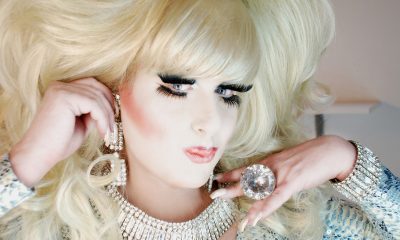Music & Concerts
Alis Vibe delivers self-enlightenment with an infectious pop beat
Your newest pop princess has arrived with a message infused inside an infectious pop beat and her new EP is called Reborn
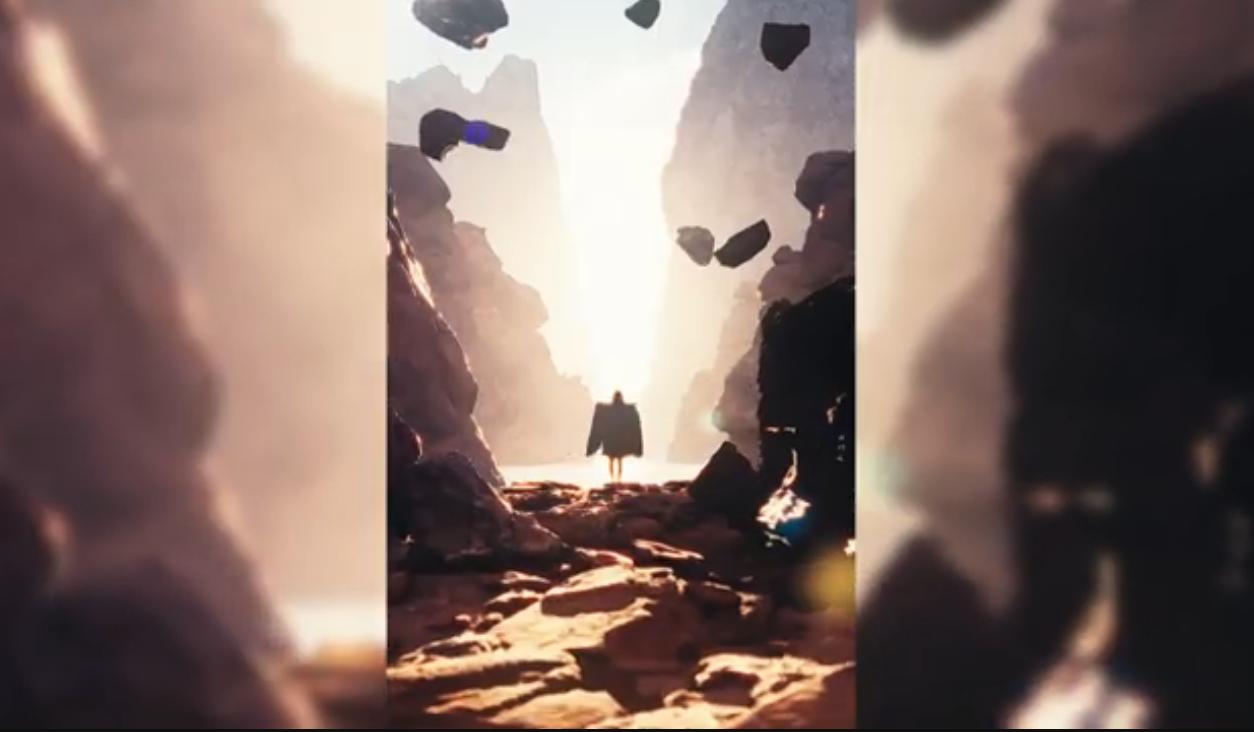
HOLLYWOOD – Your newest pop princess has arrived with a message infused inside an infectious pop beat. Her name is Alis Vibe and her new EP is called Reborn.
Vibe’s work is exciting. She originally hails from a small village outside of Milan, Italy. After getting some recognition in her native Italy, she made a spontaneous move to American music hub, Nashville.
Do not look for her to be channeling any country music queens, however. That is not Vibe’s vibe. Her music is decidedly danceable pop with folk, soul and blues undertones. She claims as her influences artists ranging from Etta James, to Freddie Mercury, to Lady Gaga to Dua Lipa. Still, her anthems would be right at home in a Kylie Minogue playlist.
“I would do an album tomorrow with Etta James, if she were alive,” Alis confides.
While her pop music layers are seductive and full of pulse-pounding rhythm, her lyrics weave in non-specific eastern spiritual traditional concepts. She projects a theme of reincarnation, even as she launches debuts into the public mainstream. “All the songs in this project are reflections of what I went through in this past year when I wrote these songs. I literally feel ‘reborn’ after pouring all my emotions into this. I feel reborn, and that is why this is the name for my first EP project,” she says.
While many in the pop sphere sing of current and past romantic entanglements, Alis’s music is more about her beliefs and life perspective. She feels the way trans and non-binary teens are treated is horrible and is happy to provide spiritual guidance on paths of self-determination. She highlights the idea of life’s preciousness. She wants to inspire freedom of expression, universal love, self-confidence, divine timing, and self-belief. Her songs are meant to speak to the hearts of those who respect and seek their own spiritual paths, promoting a sense of community and shared understanding.
Reborn, her first EP, introduces her music with an ethereal chant of self-empowerment, “Shakti the mother, universal power, prana, vital force, moon, planets, trees and flowers, energy, divine guidance, embracing changes, manifesting deep dreams, attracting abundance… releasing fears and rising again, stronger and wiser” she intones before the song Surfing the Light invites us into spiritual expansion.
Vibe sat down with me on Rated LGBT Radio and talked about her journey. She credits a yoga discipline as waking an intentionality in her, that she then integrated into her music. “It is amazing to see the outcome after that,” she tells me. “I realized who I wanted to be in my life.’
Amongst the anthems on the album, the song Ecstasy stands out as a more introspective ballad. “It is a song about the purest love you can experience,” she tells me. The song pre-dates the others. “It was on my USB drive for three years,” she says, but felt it was a perfect companion to the new material.
The pop nature of Vibe’s music is familiar, and its message can be bold, inspiring and affirming. For a young audience craving self-love, acceptance and a spiritualty they can trust, Vibe offers escape and warmth.
Vibe is assertive in her admiration for other pop stars. Gaga’s Joanne album is a favorite, and Miley Cyrus is a role model.
I asked her what it was about Miley that she admired, and Vibe told me it was because Cyrus “does what she wants when she wants to do it.” Vibe apparently reflects this herself and does what she wants, when she wants to do it. We are all the better for it.
Best of all, she wants you to do, and be, your unique you, and dance to her music while you are doing it.
Related:
*****************************************************************************************
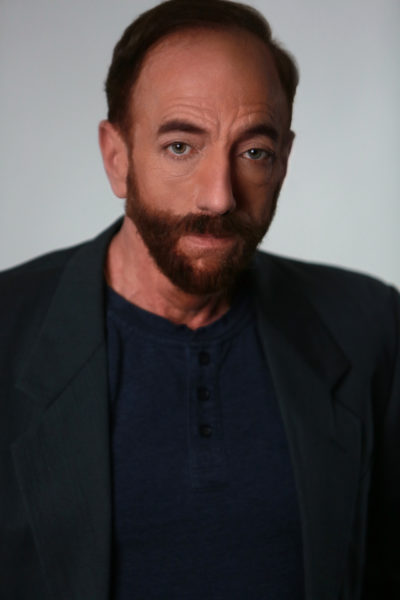
Rob Watson is the host of the popular Hollywood-based radio/podcast show RATED LGBT RADIO.
He is an established LGBTQ columnist and blogger having written for many top online publications including The Los Angeles Blade, The Washington Blade, Parents Magazine, the Huffington Post, LGBTQ Nation, Gay Star News, the New Civil Rights Movement, and more.
He served as Executive Editor for The Good Man Project, has appeared on MSNBC and been quoted in Business Week and Forbes Magazine.
He is CEO of Watson Writes, a marketing communications agency, and can be reached at robertgwatsonjr7@gmail.com
Arts & Entertainment
Craig Ramsay reunites with Catherine Wreford in full-circle moment
Their reunion is about more than friendship, it is about perseverance and the courage to celebrate life to its fullest
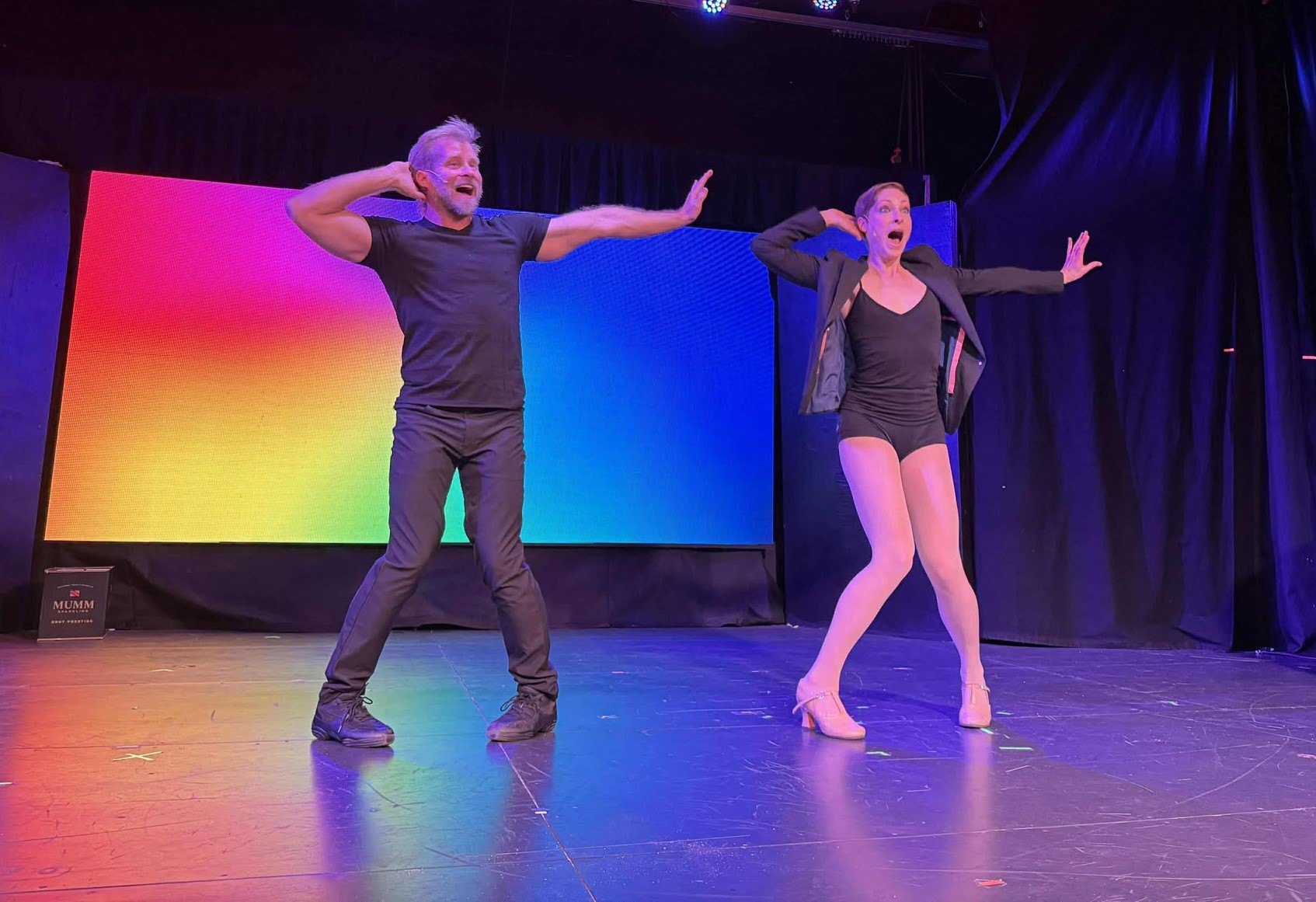
There are people in the entertainment biz, and then there are people in the entertainment biz, such as Craig Ramsay.
He has done just about everything: ballet, Broadway, reality TV, Pride events, fitness forums – he’s been there, done that and he’s far from slowing down any time soon.
A native Canadian, Ramsay earned a full scholarship to the esteemed Royal Winnipeg Ballet’s Professional Division. After his studies, he packed up his dance shoes and headed to Broadway, appearing in an early production of Mamma Mia! as well as Fiddler on the Roof, Chitty Chitty Bang Bang, Cats, Hair, and many others.
He made his national TV debut with his husband, Brandon Liberati, as one of Bravo TV’s earliest featured gay couples on “Newlyweds.” Ramsay would go on to appear on “Thintervention,” “Shahs of Sunset,” and “Real Housewives,” and hosted his own fitness show, “He’s Fit, “on OutTV. Splitting his time between Southern California and Canada, life has come full circle as he is brought back to the world of ballet and a return to reality TV, by way of a beautiful friendship forged in his early days.
When Ramsay met Catherine Wreford while studying at the Royal Winnipeg Ballet in 1996, it became an instant and long-lasting friendship. In addition to their friendship, their careers have now been linked as the two competed – and won – the “Amazing Race” in Canada. They also made a return to the Royal Winnipeg as Lord and Lady Capulet in a production of “Romeo and Juliet,” taking the stage where they met so many years before. Their reunion is about more than friendship, it is about perseverance and the courage to celebrate life to its fullest.
Ramsay and Wreford are bringing their story to the stage with “Behind the Curtain,” an intimate evening of music and storytelling, on Monday, Apr. 21, at Revolutionary Stage Company in Palm Springs.
In 2013, Wreford was diagnosed with terminal brain cancer and given a limited time to live. Now, more than a decade later, she continues to defy the odds and though performing may sometimes offer unique challenges, she continues to take her bow.
We caught up with Ramsay in between performances of his second return to the Royal Winnipeg Ballet for its production of “Jekyll and Hyde” to chat about his career, the power of friendship and his upcoming cabaret.
You have done all kinds of reality TV. What inspired you to do the Amazing Race? It was totally different than what you had done before!
My best friend—and Amazing Race partner—Catherine is a medical miracle. She was given 2 to 5 years to live after being diagnosed with terminal brain cancer … 12 years ago. She thrives on challenges that push her both physically and cognitively, and few things are more intense than The Amazing Race. When I suggested the idea to her, she didn’t hesitate for a second. She said: “We’re doing it—and we’re doing it together.”
It was also the first reality show that appealed to me in a completely different way. Unlike other formats I’ve been part of, “The Amazing Race” doesn’t rely on producers engineering drama or plot lines. You don’t know what’s coming next, and neither does anyone else. It felt like a rare opportunity to do reality TV that’s truly grounded in, well… actual reality. That unpredictability, combined with the chance to take on something extraordinary with Catherine, was the perfect kind of wild.
What did you learn most about yourself from getting through Amazing Race?
What I learned most about myself from “The Amazing Race” was that in moments of chaos, I can find calm, and in that calm, I find clarity. Despite being diagnosed with ADHD and told it would be a lifelong obstacle, I discovered my ability to hyper-focus was actually a superpower on the [The Amazing Race]. It helped me dial in, think fast and power through challenges with my teammate like a laser-focused tornado. Turns out, my brain was built for the pressure!
You have returned to the stage in many ways, ballet and your duo-cabaret! What has it been like for your body and your mental psyche to get back into ballet? Life has come full circle!
Returning to ballet in my late 40s has been a full-circle moment—and a full-body wake-up call. I’ve got way more going on now personally and professionally than I did in my 20s or 30s, and while I’m proud that my body can still meet the demands of roles like Danvers Carew in “Jekyll & Hyde” with the Royal Winnipeg Ballet, I’d be lying if I said it was easy. My brain takes longer to lock in choreography, but I’ve learned that if I lead with the storytelling, the steps follow. It’s a more actor-driven approach to dance—one I wish I used in my youth. As for revisiting my 20s-era dance numbers in our cabaret “Behind the Curtain?” Let’s just say I’m doing them … slightly out of breath and trying not to have a heart attack mid-sequin spin in front of a live audience.
“Behind the Curtain,” what is it like hitting the stage without a role, totally vulnerable and intimate, just you and Catherine telling your own stories with songs?
Hitting the stage without a role to hide behind—just me, Catherine, a mic, and our stories—has been the most vulnerable and freeing experience of my career. When we created “Behind the Curtain,” every moment we debated cutting for being too raw, too shocking, or too hilariously honest… we kept it in. We don’t hold back. Every Broadway chorus veteran has wild stories—we’re just bold (or foolish) enough to share ours. Playing characters is easy. Telling the truth about who we are? That’s the real performance. Most of what we reveal on stage has only ever been shared between the two of us. In this show, you get to know us more intimately than any reality show ever could. It’s terrifying but thrilling at the same time.
What makes this performance different than anything you have done before?
Even though Catherine and I have played major roles on Broadway, this show feels like the biggest undertaking of our careers. It’s just the two of us, holding the stage for two full hours—no cast, no set pieces, no costumes to hide behind. Just our voices and our stories. Honestly, it feels like we’re at our own celebration of life… except we’re not dead—we’re just killing the audience with our stories.
Why is it so important for you and Catherine to continue telling your stories with “Behind the Curtain?”
We actually talk about this in the show—because the truth is, with the uncertainty around how much time Catherine has left, “Behind the Curtain” is our way of getting it all out there. It’s the legacy she deserves. It’s raw, it’s pretty, it’s messy… it’s us. And that’s what makes life beautiful. We want this show to inspire people to live fully, love fiercely, and honor the friendships and chosen family that carry us through it all.
Catherine is such an inspiration in so many ways. How did your friendship evolve, and what can we all learn from her?
What people might not know is that our friendship started with me playing the role of the responsible older brother, trying to rein in Catherine’s fearless, defiant teenage fire. We entered the industry young and had to be everything for each other—mentors, lifelines, protectors. Our bond has evolved through so many chapters, that it feels like it’s had seven lives. Honestly, we don’t think we’d be alive without one another. And as wild as it sounds, we both believe our higher selves are holding hands, plotting these incredible, often chaotic moments that turn into stories we’re meant to share with the world. We’re connected in this life… and beyond.
With so many different entertainment projects you’ve done, what direction do you head to next?
It wasn’t something we originally set out to do, but after the overwhelming feedback from “Behind the Curtain,” we feel the next step is Off-Broadway. That’s where the show is headed. At the same time, we’ve taken the inspiring stories we’ve lived—centered on friendship, kindness, and compassion—and created something new: the first-ever keynote presentation told through story, song, and dance. It’s called “Survival of the Friendliest,” and we’re partnering with the Speakers Bureau of Canada to bring it to audiences across the country.
What is your message to your fans?
Our show “Behind the Curtain,” is resonating with people in such different and personal ways, that it wouldn’t feel right to narrow it down to one message. At this point in our lives, careers, and friendship, the best thing we can do is share our stories honestly and let them land however people need them to. If we’re bringing “Behind the Curtain” to your city—or somewhere nearby—we’d love for you to come experience it. And if you’re part of an organization or business that hosts keynote events, reach out! We’d be honored to inspire, entertain, and connect with you.
Tickets can be purchased here.
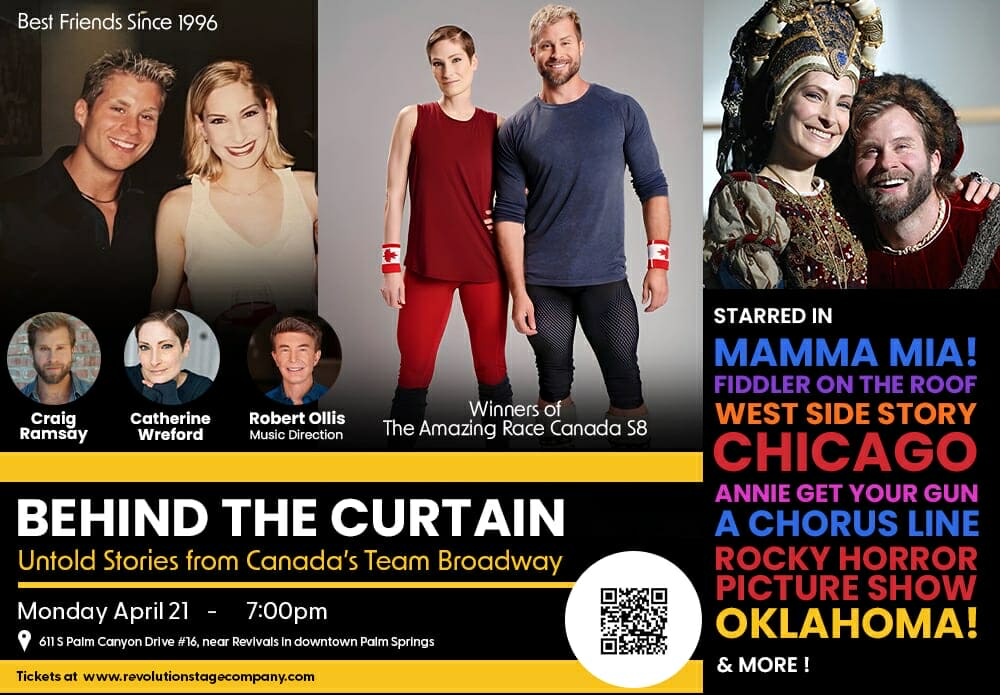
Music & Concerts
J. Lo, Troye Sivan, RuPaul added to WorldPride Music Festival
Two-day event to feature array of musical genres

WorldPride organizers on Tuesday announced two new headliners for the WorldPride Music Festival at RFK Festival Grounds (2400 East Capitol St., N.E.) June 6-7 in Washington, D.C.
Superstar Jennifer Lopez and gay pop artist Troye Sivan are set to headline, while drag trailblazer and TV star RuPaul will also take the stage for a DJ set.
Taking place over two days and nights and across three stages, WorldPride Music Festival will showcase a diverse range of music. Beyond pop stars and drag performances, house, EDM, techno, country, R&B, and a host of other genres will be heard across the weekend.
Featured LGBTQ audience fan favorites include Kim Petras, Rita Ora, Betty Who, and Marina. House and electronic fans will enjoy Zedd, Grimes, Purple Disco Machine, and Sofi Tukker. Other top-billing pop stars include Tinashe, Raye, and Grimes; Paris Hilton is also set to make an appearance.
Other artists that will bring their sounds to one of the stages include Aluna, Anabel Englund, Anne Louise, Coco & Breezy, Crush Club, Dombresky presents Disco Dom, Galantis, Hayla, Kaleena Zanders, Karsten Sollors, Leland + Friends, LP Giobbi, Matt Suave, Patrick Mason, Sasha Colby, Slayyyter, Spencer Brown, Trisha Paytas, and Ty Sunderland.
The music festival came together as a partnership between Capital Pride, Dreamland’s producer Jake Resnicow (who ran WorldPride in New York), and event promoter Club Glow, which has produced several music festivals in the region. Club Glow is set to host a separate festival, Project Glow, also to take place on RFK grounds the weekend prior to WorldPride.
Resnicow, as executive producer, noted that, “WorldPride Music Festival is a moment the world will remember. With legendary artists and our global community coming together, we’re creating an electrifying celebration that unites, uplifts, and amplifies LGBTQ+ voices like never before.”
Given the current political climate and anti-LGBTQ policies sweeping the country, “Hosting this festival in our nation’s capital makes it even more powerful — it’s not just a party, it’s a global movement.” Resnicow added.
Beyond the music, the festival will feature art installations and immersive experiences that celebrate the spectrum of LGBTQ culture, along with food and drink, specialty cocktail lounges, giveaways, and a VIP section. Proceeds from the event will benefit the nonprofit Capital Pride Alliance and other local LGBTQ community organizations, ensuring the festival’s impact extends beyond its two days of programming. WorldPride marks the 50th anniversary of Pride in the capital.
General admission, GA+, and VIP tickets start at $209.
Music & Concerts
Lana Del Rey, Katy Perry plan fall releases
A Fleetwood Mac live album, more Joni archives among vintage options

Paris Hilton released her “Infinite Icon” album on Sept. 6. It’s just the second effort following a massive hiatus — her debut album “Paris” was released way back in 2006. Sia produces. This summer’s “I’m Free” was the first single. A tour is planned. Hilton promised a “heavily gay-leaning release.”
Miranda Lambert’s “Postcards from Texas” is slated to drop today. Lambert’s 10th studio album was preceded by the May release of single “Wranglers,” which stalled in the lower 30s on country radio. Lambert calls the album a musical ode to her home state. She co-produces with Jon Randall and either wrote or co-wrote 10 of the project’s 14 cuts.
Katy Perry’s “143” is set for a Sept. 20 release. It will be her seventh studio album. Its title refers to what she says is her symbolic angel number. Perry is aiming for a dance party feel working with producers Max Martin, Dr. Luke, Stargate, Vaughn Oliver and Rocco Did It Again! The proceedings are not off to a strong start. First single “Woman’s World” stalled at No. 63 on the Billboard Hot 100. Follow-up “Lifetimes” failed to crack the Hot 100 at all.
Fleetwood Mac releases “Mirage Tour ’82” on Sept. 20. It includes six tracks previously unreleased including “Don’t Stop,” “Dreams,” “Never Going Back Again,” “Sara” and more. Available on double CD, triple vinyl and digitally.
Volume four of Joni Mitchell’s “Archives” series dubbed “The Asylum Years: 1976-1980” releases Oct. 4. It’s being offered in six-CD or four-LP (highlights) configurations. It will feature unreleased studio sessions, alternate versions, live recordings, rarities and a 36-page book with new photos and an extensive conversation between Mitchell and filmmaker/uberfan Cameron Crowe.
Sophie B. Hawkins releases her “Whaler Re-Emerging” album (a re-recording of her landmark 1994 album) on Oct. 15. Order through her site and the first 250 copies will be signed. Hawkins (who identifies as omnisexual) says it surpasses the original.
Joe Jonas’s “Music for People Who Believe in Love” and Shawn Mendes’s “Shawn” are both set for Oct. 18 releases. Jonas’s album (his first solo effort since 2011’s “Fastlife”) will feature songwriting he says is of a more personal nature. Billboard called it “unvarnished” but with a shimmery pop sound aglow with garage rock and alt-pop influences. First single “Work It Out” was released over the summer and failed to chart.
“Shawn” will be Mendes’s first album since 2020’s “Wonder,” the tour of which he cancelled citing mental health. Two singles — “Why Why Why” and “Isn’t That Enough” — have been released. The former stalled at no. 84 on the Hot 100. He has called the album his “most musically intimate and lyrically honest work to date.”
Lana Del Rey’s “Lasso” is expected for a possible fall release, although some sources say it’s been bumped to early 2025. No date had been announced as of yet. She’s apparently going the Beyonce route and releasing a straight-up country album.
Dolly Parton plans a Nov. 15 release for “Smoky Mountain DNA — Family, Faith & Fables.” Parton recruited family to help her on the 37 (!)-track collection, which will also encompass a four-part docuseries tracing Parton’s familial roots. One song (“A Rose Won’t Fix It”) is an outtake from the feverish writing sessions that led to her solid (but underrated) 1998 album “Hungry Again.” An extremely limited-edition triple vinyl release is also planned.
Release dates shift and many more releases will be announced later. Pitchfork keeps a great running tab at pitchfork.com/news/new-album-releases. Also check your local record store for Black Friday special editions available on Friday, Nov. 29. Release info was scant as of this writing.
(Joey DiGuglielmo was variously the Washington Blade’s news and features editor from 2006-2020.)
Music & Concerts
Kylie Minogue makes hearts go PADAM at WeHo Pride OUTLOUD
Pop singing sensation Kylie Minogue delivered a string of her biggest hits at the WeHo Pride OUTLOUD Music Festival on Sunday

By Paulo Murillo | WEST HOLLYWOOD – Pop singing sensation Kylie Minogue delivered a string of her biggest hits at the WeHo Pride OUTLOUD Music Festival on Sunday, June 2, 2024. The highly anticipated concert included songs like “Come Into My World,” “Spinning Around,” “All the Lovers,” “Can’t Get You Out of My Head” and “Padam-Padam” to name a few.


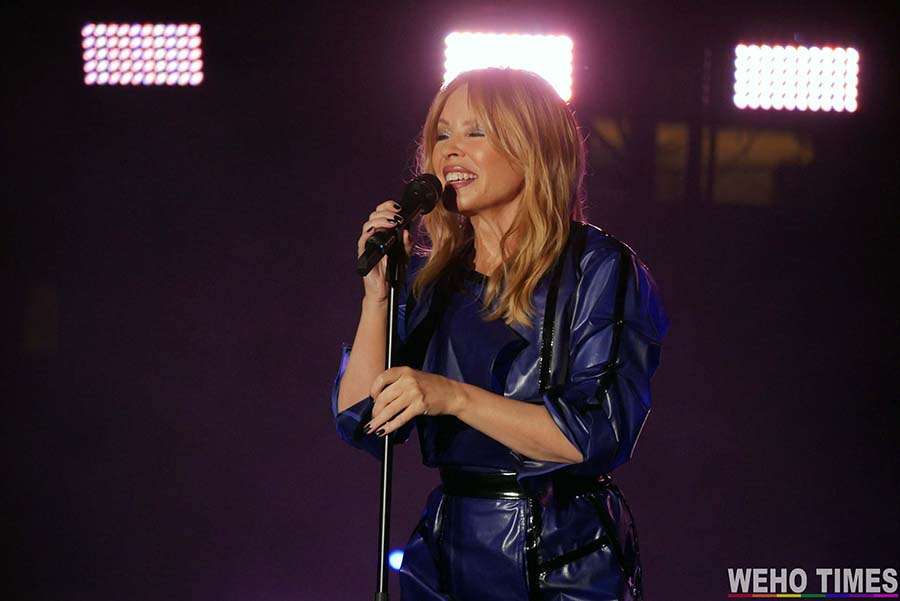
The Australian pop goddess also debuted a new song, a duet with fringed-mask-wearing country singer Orville Peck, called “Midnight Ride,” produced by Diplo, who also joined the duet on stage.
The performance, part of the LGBTQ+ concert event, captivated the audience and has since garnered attention online, with a clip of their duet circulating widely. “Midnight Ride” is now available for pre-order on all music download platforms.
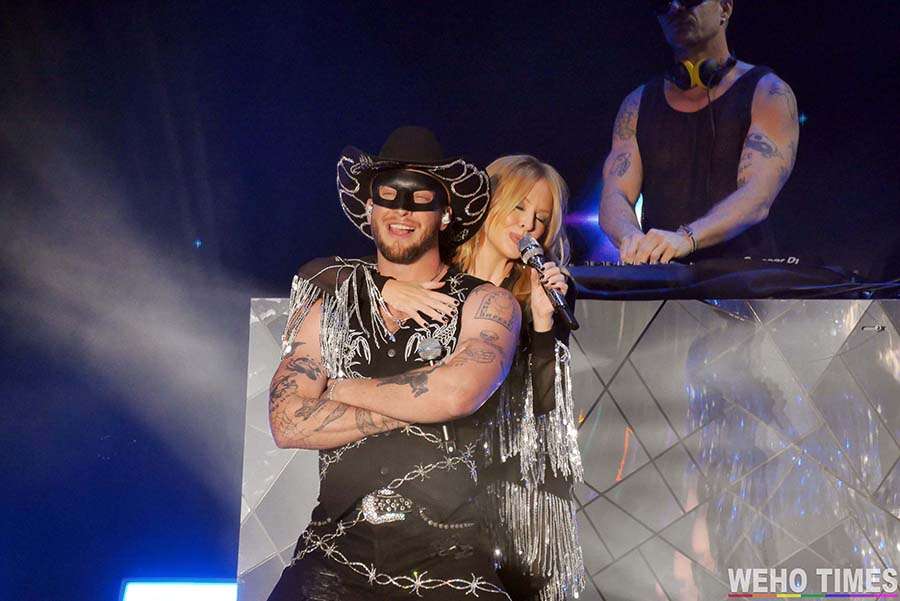
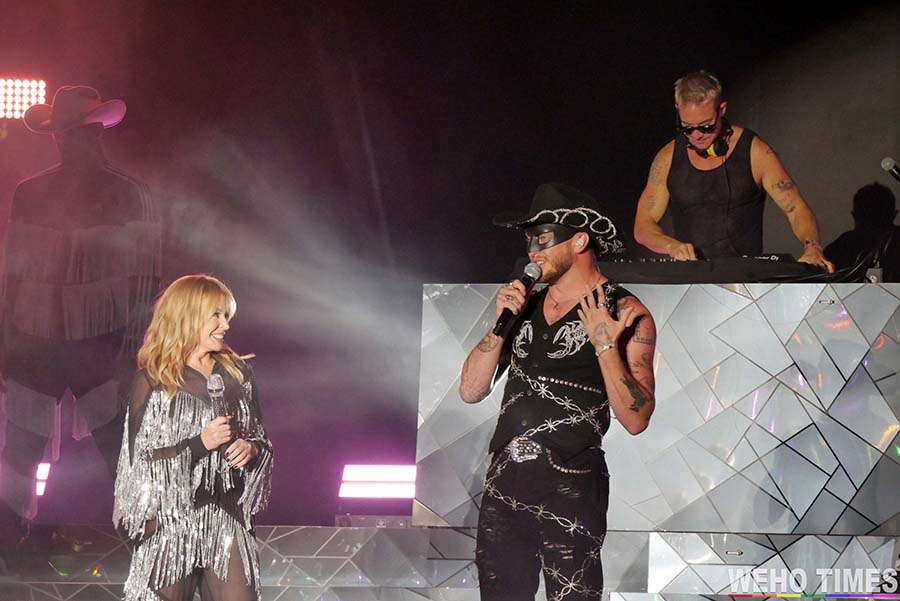
According to reports Minogue is teaming up again with Lostboy, the producer behind her hit “Padam Padam.” Lostboy, whose real name is Peter Rycroft, hinted at their new material, suggesting it could be part of a follow-up to Minogue’s 2023 album, “Tension.”
“Padam was its own thing, it’s lived its own life. The new stuff is so fun as well in its own way. I don’t know when it will be out,” Rycroft told The Sun newspaper’s Bizarre column.
Orville Peck and Diplo are no strangers to the WeHo Pride OUTLOUD Music Festival in West Hollywood. Diplo did a DJ set on Sunday night right before Kylie hit the stage for her own performance, and Orville was a main headliner at last year’s WeHo Pride music event.
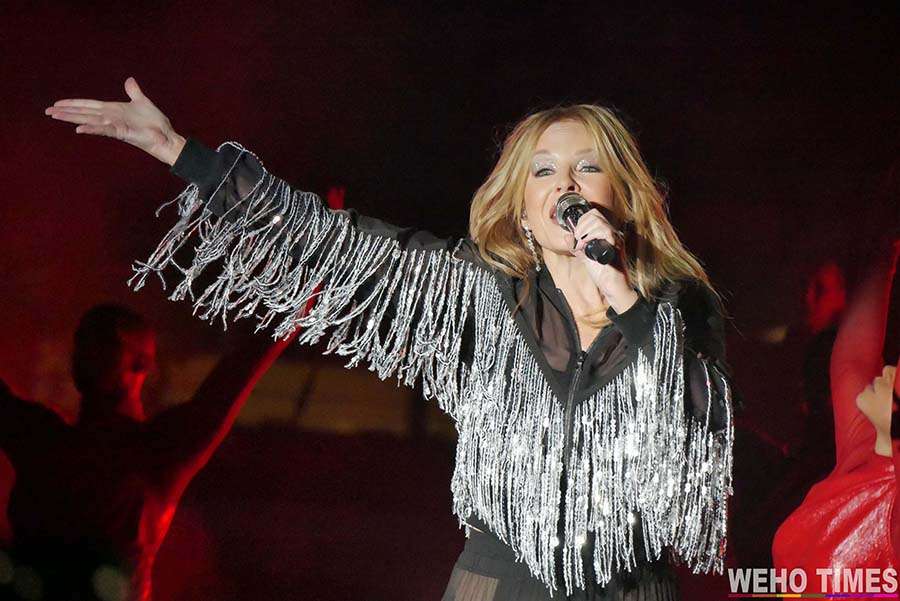
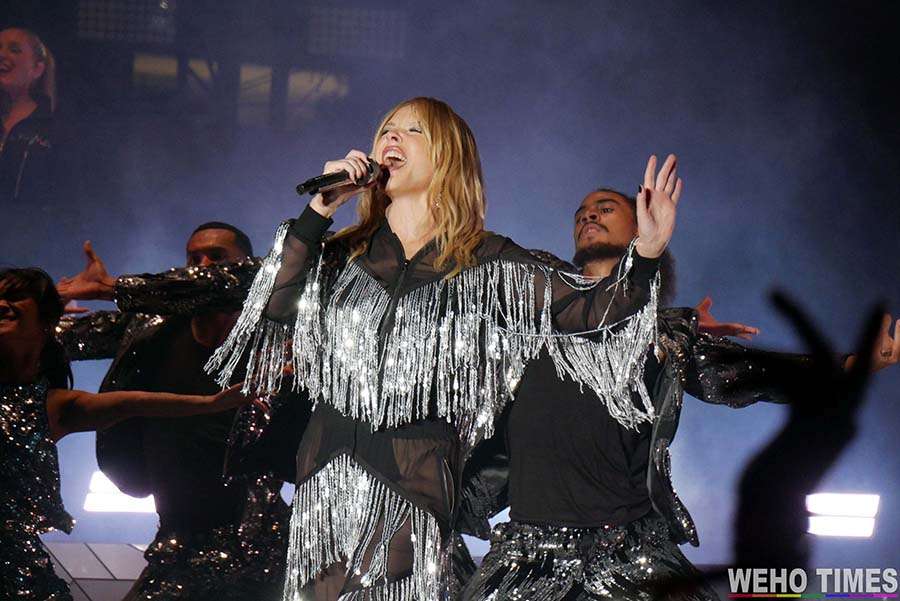
The crowd was massive and could be heard singing along to all the classic tunes. Kylie had two outfit changes. The set was tight, and there was no encore performance. Sources report that she had a plane to catch right after the show.
During Kylie’s set, West Hollywood Mayor John Erickson, Vice Mayor Chelsea Byers, and Council Member Sepi Shyne joined the singer on stage to inform her and the crowd that the City of West Hollywood has declared June 2nd as Kylie Minogue Day. They also presented her with a Kylie Minogue Way street sign to commemorate the day. She showed off her sign to the crowd and thanked the council for the welcome.
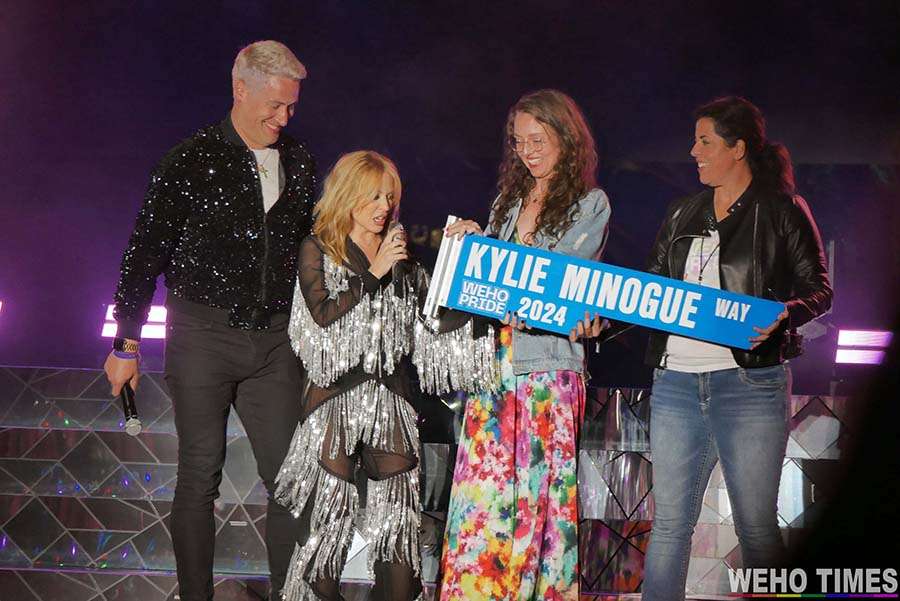
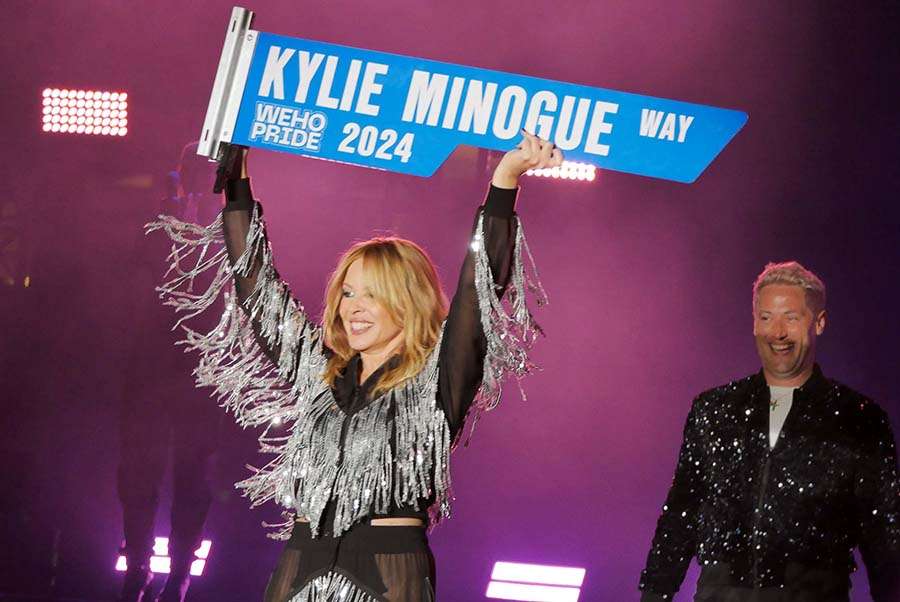
Kylie’s performance was the wrap-up for WeHo Pride 2024.
******************************************************************************************

Paulo Murillo is Editor in Chief and Publisher of WEHO TIMES. He brings over 20 years of experience as a columnist, reporter, and photo journalist. Murillo began his professional writing career as the author of “Love Ya, Mean It,” an irreverent and sometimes controversial West Hollywood lifestyle column for FAB! newspaper. His work has appea
******************************************************************************************
The preceding article was previously published by WeHo Times and is republished with permission.
Music & Concerts
The Voice crowns its very first LGBTQ winner with Asher HaVon
After 25 seasons, The Voice has crowned Asher HaVon. Asher is more than a voice, he is the spiritual representation of equality itself
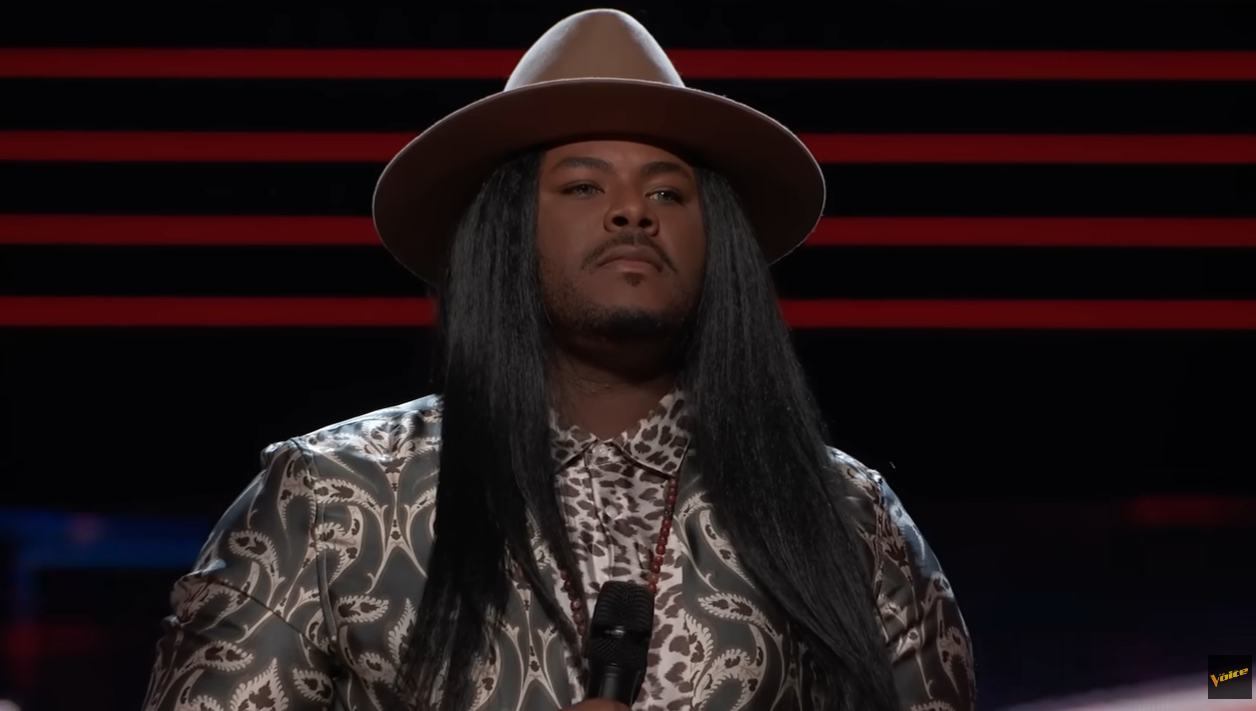
HOLLYWOOD – So, the LGBTQ pundits and culture watchers were… wrong. Or at the very least, anticipating “history” way before its time. After frustration over American Idol’s inability to crown an LGBTQ winner, they held high hopes for a new competing star-making vehicle, The Voice.
In 2011, The Advocate burst with excitement saying “There’s no need to wait on NBC’s new vocal competition, The Voice. The show boasts four gay contestants — two men and two women — heading into the battle round, where they will be coached by the likes of Blake Shelton, Cee Lo, Christina Aguilera, and Adam Levine. And while a couple of them might be eliminated in the next few weeks (in the battle round, teams of eight are whittled down to four when teammates face each other in a sing-off), chances that there will be a lesbian or gay singer competing to become the first “Voice” are strong.”
Well. Not so strong. All of the LGBTQ contenders were eliminated. As were others over the years that even included a young transman singing with his father as one of the show’s few duet contestants. American Idol did end up crowning an LGBTQ winner in its 18th season.
That was then… and this is now. After 25 seasons, The Voice has crowned Asher HaVon its winner. It is no wonder, as Asher’s vocal tone is hypnotic, rich, and blows through your auditory senses. Listening to him hit certain notes in his vocal runs can bring you to a flood of emotional tears. At least, it did for me.
It did for coach Reba McIntire as well.
The significance of Asher HaVon’s win goes beyond just a queer identity. It is adorned with a depth of representation and visibility. When Asher stepped on stage, he brought culture, diversity, history, and identity.
Like many incredible vocalists, he comes from a church foundation. Reba McEntire was a wise coach choice, relating to a broad reach of American sensibilities. She is one of the rare entertainers who is beloved by fans across the broad political spectrum. She is traditional, but an ally.
In a bit of irony, there is a segment of his hometown that still are keeping his LGBTQ status in the closet. The Selma Times Journal brags about his “historic win”, but when they write about it, they are referring to the fact that he is the first winner from Alabama. They do not mention his LGBTQ identity at all.
Not sure how they could miss it. Asher presents in full-beat makeup with gorgeous nails to diva quality eye makeup and lashes. His costuming was never anything less than fabulous. His song choices placed him in a pantheon of LGBTQ-worshipped goddesses that included Adele, Beyonce, Whiney Houston, Patti LaBelle, Toni Braxton, Tina Turner, and Donna Summer. He was not only courageous to take on their groundbreaking hits, but did so with the talent to impress with his own versions of them.
As Asher stands on stage, he also represents a proud black man living in the spirit of America’s civil rights movement. He truly does represent Selma Alabama, and its fight for equality significance is part of his DNA and his history. In 2015, when President Barack Obama visited the city, Asher sang for him in front of a crowd of 200,000 at the famed Selma Bridge crossing.
While the significance of that event is not lost on him, Asher calls it one that he “will never forget”, he tells the Montgomery Advertiser that The Voice “is different because it is the Asher HaVon that most people never got a chance to see. I am free. I am walking in the authenticity of who I am, while sharing my gift. That means so much more to me than any other experience than I’ve ever had in life.”
While Asher carried his legacy, the history he represented, and his authenticity into every performance he gave over the show’s run, it was his pure talent that put him on top. It was so impressive that it even broke through the show’s premise of four celebrity coaches battling it out for a win. Under that guise, each of the coaches pleads with America to vote for their protégés.
Asher had most of them pleading for him instead. He initially received three “chair turns” at the outset where Chance the Rapper, Dan & Shay, and Reba were the celebrities campaigning for him to pick them. John Legend was the hold-out. Asher, ever the diva connoisseur, had already picked Reba in his mind and would have picked her no matter what anyone else had said.
Legend, later in the season, shared that he received a phone call from his dad who declared not only that he was rooting for Asher, but that Asher was “THE” voice of the season. Both Legend and Chance declared Asher to be “the best vocalist on the show” several times in their feedback statements.
While Asher’s win and authenticity should bring a source of joy to LGBTQ fans, it also is a big boost for his coach and main champion, Reba McEntire. While the show has put a full-throttle on Reba as the “queen of country” and showered her with adoration, she has had some difficulty in wowing many of the auditioning singers onto her team. Asher represents a significant win for her, as well as her being also the coach for first runner-up Josh Sanders, when she starts the next season against Gwen Stefani, Michael Bubble, and Snoop Dogg. The latter two are newcomers and Stefani boasts only one previous win years ago, but a loss in her one previous match-up against McEntire.
For the future Voice contestants, Reba has some serious creds to play.
For the rest of us, in the LGBTQ community, in the dance clubs, and in the hearts of ones needing a new diva to love, Asher has arrived.
Related:
Asher HaVon and Coach Reba perform Patti LaBelle and Michael McDonald’s “On My Own” during The Voice finale.
******************************************************************************************

Rob Watson is the host of the popular Hollywood-based radio/podcast show RATED LGBT RADIO.
He is an established LGBTQ columnist and blogger having written for many top online publications including The Los Angeles Blade, The Washington Blade, Parents Magazine, the Huffington Post, LGBTQ Nation, Gay Star News, the New Civil Rights Movement, and more.
He served as Executive Editor for The Good Man Project, has appeared on MSNBC and been quoted in Business Week and Forbes Magazine.
He is CEO of Watson Writes, a marketing communications agency, and can be reached at robertgwatsonjr7@gmail.com
Music & Concerts
Here is the Earth Day anthem we forgot we needed
Singer/songwriter Anne Stotts releases Water to Blood as our collective call to action as we mark Earth Day
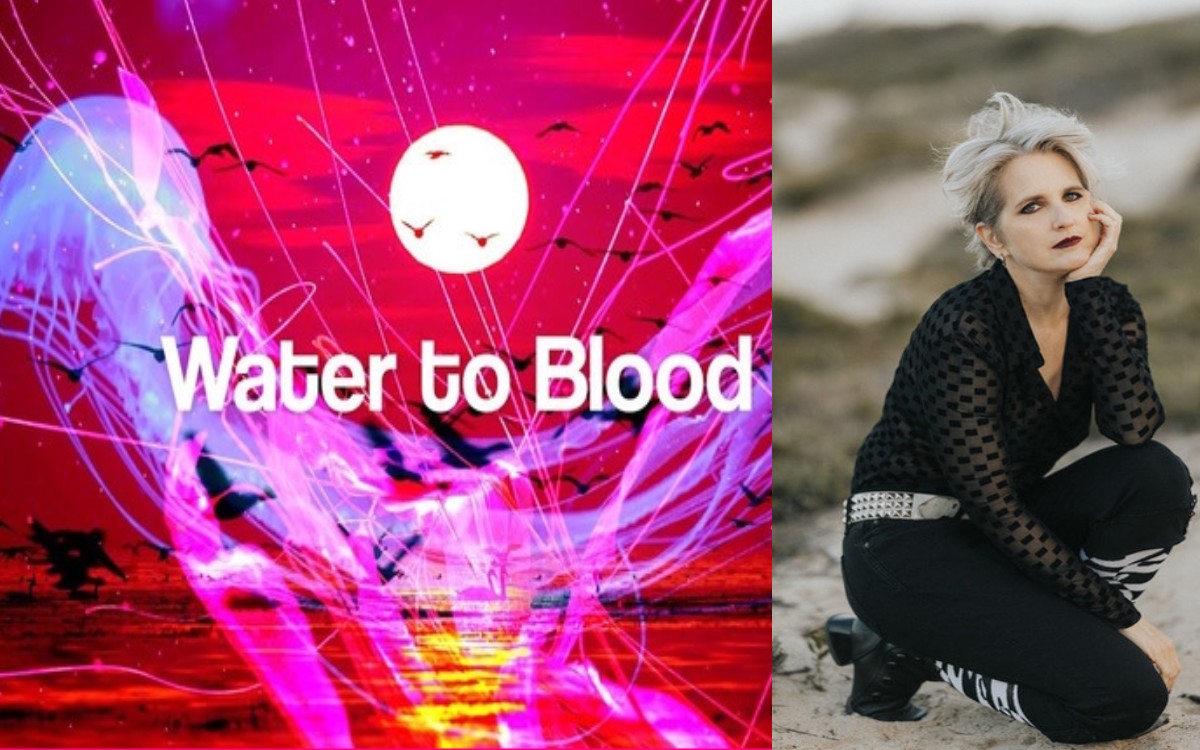
HOLLYWOOD – The evolution of Earth Day, from its inception in 1970 to the global movement it is today, has been accelerated by dire and extreme climate change events that do not seem to have garnered the political attention they deserve. Cataclysmic events have underscored the reality of global warming in the face of industries and populists who want to deny it.
Earth Day 2024 is a day that united millions in the past and continues to inspire action towards environmental sustainability and conservation today.
As glaciers melt and weather systems buckle, we need a call-to-action anthem. Just as We Are the World unified hearts and minds against famine and starvation, we need to blast the climate change cause to reach souls where other agendas may be keeping their minds in the dark. Music transcends barriers, connecting with people on an emotional level and inspiring change in ways that statistics and reports cannot.
Anne Stott’s Water to Blood is the anthem we need this Earth Day. It strives to inspire us all, and the powers that be, to address the climate crisis NOW.
You can squeeze the earth til it’s dry and the people til they’re weak, build a wall so high you can’t hear the screams, but so far we’ve had fires, floods and now the plague. This empire’s dying cause it can’t face change. The time’s here now, it’s not coming… it’s come. Water to Blood
Incisive. Vibrant. Dramatic. Anne Stott is a singer/songwriter of cinematic alt-rock, an actor, and an apolitical rabble-rouser. Her “bad girl to the good girls and good girl to the bad girls” energy infuses her music and live performances with edgy compassion while her elastic style embraces eighties pop and nineties grunge infused with a modern moody atmosphere.
Produced by Blondie/Rufus Wainwright producer Barb Morrison, the Water to Blood anthem smashes the psyche to its core, leaving the listener energized, motivated, and with a sense of urgency that too much time has passed to ignore our collective environmental crisis any longer.
“The Right Wing is so GOOD at spinning,” Anne Stott tells me when we sat down for the Rated LGBT Radio podcast. “My hope for this song is that it will motivate people who haven’t been engaged in climate change to get more active and it will be a comfort and it will help rejuvenate and energize those who have been devoting their lives to make change. I think the production of the song combined with the lyrics creates a nice synergy of political takedown and an optimistic, motivational vibe. And I definitely have both of those sides. I am always deeply moved by people standing up for what is right and if this song can contribute to people’s struggle to protect our future on this planet that would make me really happy”
As a quirky queer singer-songwriter and film actress that splits her time between Cape Cod and New York City, Anne wields a unique worldview as someone who was formed by growing up internationally.
Born in Philadelphia, she grew up in Luxembourg and moved to the UK, then Minnesota and New York City. She moved to Provincetown in 2007 for a writing retreat for a few months and ended up staying. She busked in the street outside of the town hall and got discovered by director David Drake, who cast her in a play at the local art house.
She was involved in political activism (she was a member of the Lesbian Avengers) but “hit a wall” because she wanted to do something more creative. She has released two albums of original music, Love Never Dies and Pennsylvania.
Who does she see as the biggest villains against a climate change solution? Big Plastics, and Big Oil. “The plastics industry and the oil industry are going to hold on to their propaganda until they can milk every penny they can from the planet,” she says.
Being in New York City when wildfires in the east clouded the sky, Anne was impacted. “It was like something out of a horror movie,” she recalls. “We HAVE to stop calling these things anomalies. The anomalies are no longer ‘anomalies’. I have to stop myself from calling these ‘distinct events’, no, this is the normal now and it is really scary, and it is really hard to own that.”
Is there hope? “I am very inspired by the youth movements around climate change. They are not as big in the news right now, but there is a lot of engagement with people in their 20s and their teens, and that is very inspiring.”
“I think of the government coming together for the Manhattan Project and the development of the atomic bomb. We need that level of commitment, drive, and expertise to come together to look at this from all angles. People want to do more, but we have shaped this culture around convenience, and it is hard to walk that back individually,” she adds.
When she is not saving the world, Anne and her music is a bewitching synergy between Joni Mitchell and Chrissie Hynde, performing sincere and engaging personal songs as well as those about social change and political takedown.
The Water to Blood climate change track launches today to coincide with Earth Day. It will be also on her upcoming album Watershed Synapse Experience which comes out in September. (Also produced by Barb Morrison).
In the meantime, she will be releasing more singles from thought-provokers on racism, to a hot dance track. While you wait, download Water to Blood, turn up the volume and wake up everyone in listening distance.
Literally and figuratively – because the crisis isn’t coming, it’s come.
Watch:
*********************************************************************************

Rob Watson is the host of the popular Hollywood-based radio/podcast show RATED LGBT RADIO.
He is an established LGBTQ columnist and blogger having written for many top online publications including The Los Angeles Blade, The Washington Blade, Parents Magazine, the Huffington Post, LGBTQ Nation, Gay Star News, the New Civil Rights Movement, and more.
He served as Executive Editor for The Good Man Project, has appeared on MSNBC and been quoted in Business Week and Forbes Magazine.
He is CEO of Watson Writes, a marketing communications agency, and can be reached at robertgwatsonjr7@gmail.com
Related:
Music & Concerts
Raw & resolute, Damez brings the intersectional image we need
He showcases his talents & versatility through an eclectic catalog of self-penned songs, choreography-heavy visuals & performances
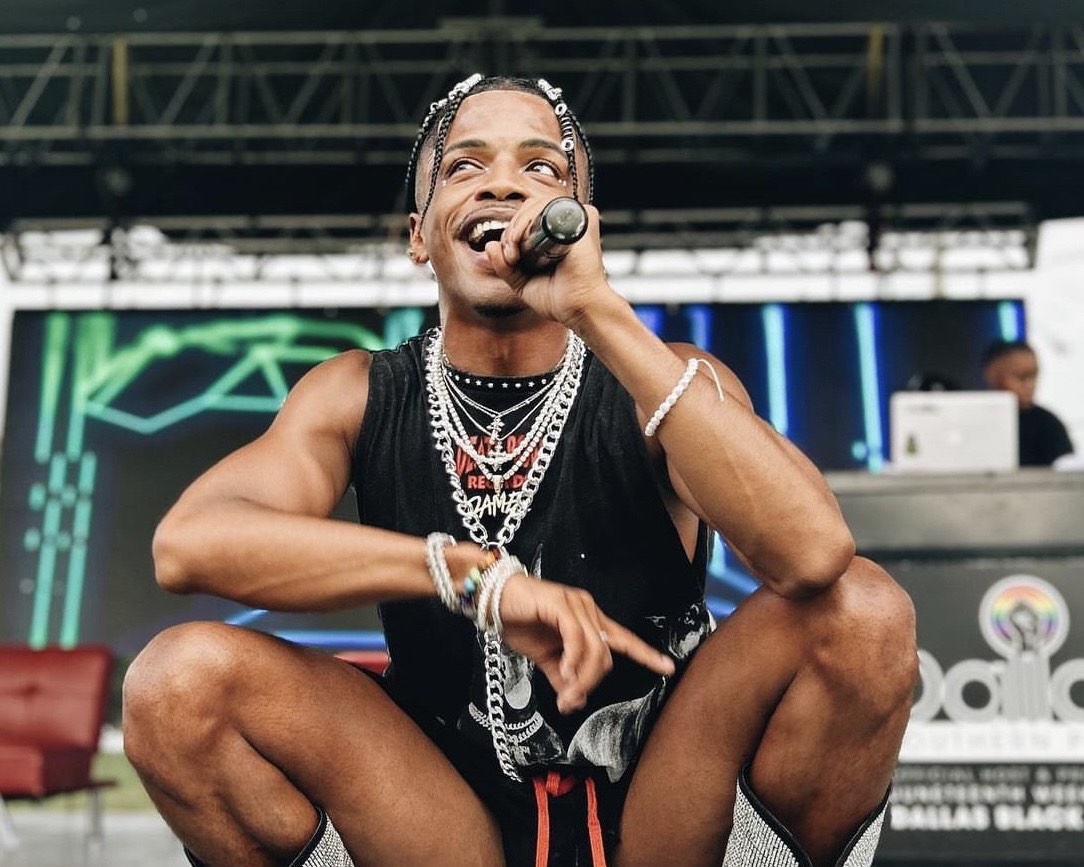
ATLANTA, Ga. – In ancient times, to refine gold, a craftsman would sit next to a hot fire with molten gold in a crucible, and he would skim out the dross that rose to the top of the molten metal. Like that fine, purified precious substance, hip hop star Damez is ready for the trial by fire to end, and the golden life to begin.
He says as much in his new album Hell Now, Heaven Later. Over the course of the 17 tracks, in a cavalcade of street poetry, Damez empties his closet of tragedy, racism, homophobia and struggles he has experienced in his young life.
“I am intentional on everything I do,” he tells me on the podcast Rated LGBT Radio. “Life was putting me through things I couldn’t ignore, I needed the record to serve … I needed to address the issues, the pain the trauma head on.”
At times raw, at times resolute, at times angry, the album stuns in its honesty. It is a testament to both being defeated, and also resolving to moving ahead with hope. Thus, the name Hell now, Heaven later.
His family moved to Atlanta when he was 6, born in Mississippi. Life was great, and his childhood was perfect. He was the kid with a thousand questions and wanted to know everything. He already adored Destiny’s Child even at that age– “I was a music kid,” he says.
His parents were divorced when he was in high school, but as difficult as that was, it was nothing compared to the horror coming. When Damez was a senior in high school, his brother, Ryan, close to him in age, and his best friend, was murdered. “They were back-to-back traumatic experiences that did a lot of damage to my soul, my happiness and my confidence.”
He describes his brother to me. “He was just the coolest, most down to earth, precious soul. He made you feel like you belonged, he had your back. It is a void I have been trying to fill for 12 years. No one knows you like your big brother does. No one has your back. That kind of loss changes the chemistry in your brain.”
His greatest champion was gone, but music was still there for him, however, as it always had been. He came out sexually to his family, which was not met at first with great acceptance. Depressed, lonely and defeated, he pulled through by creating songs. He loaded his closet, now that he was out of it, with studio equipment, and the rest, as he says, “was history.”
He is now a rapper, singer, dancer, songwriter, editor, creative director, and a rising star in music. With a focus on rap and R&B, he showcases his talents and versatility through an eclectic catalog of self-penned songs and choreography-heavy visuals and performances.
His world has been exploding with possibilities ever since.
He was named the “New Face of Atlanta’s Music Scene” by Out Magazine’s Pride edition in 2020, as well as Atlanta Magazine.
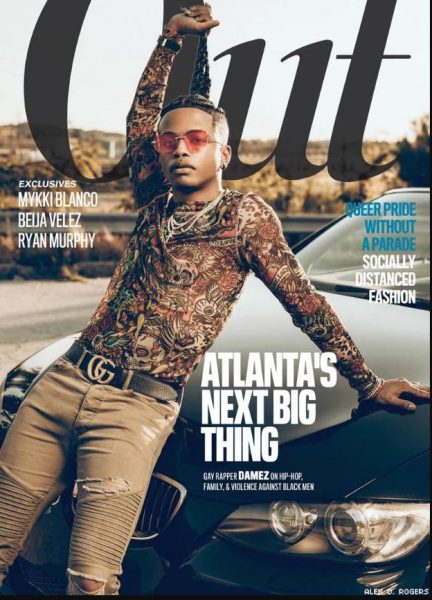
Photo of Damez by Alex D. Rogers
Out Magazine, in fact, put him on their cover.
In 2022, MTV News said Damez was ready to take the throne. He was featured on Billboard.com twice, as part of their ‘Billboard Pride’ playlist for his 2019 singles “Pull Up” and “Big Mood.” He’s performed for Atlanta’s Black Pride Festival in 2019, 2021, & 2022, as well as other notable performances such as 2021’s MOBI Fest, Human Rights Campaign’s HBCU Summit in 2019, and opening for original Dreamgirl Jennifer Holliday during NAESM’s 2020 Leadership Conference.
An advocate for equal rights and healthcare, he has participated in numerous campaigns for The Centers for Disease Control and Prevention and Gilead’s Truvada for PrEP Medication, among others.
More recently, he was featured in a 2022 campaign alongside Tina Knowes-Lawson and others for British multinational pharmaceutical ViiV Healthcare’s HIV campaign, ‘Me in You, You in Me’ to end HIV stigma and raise awareness on preventive medication.
His earliest work, that gained great popularity and play time in clubs, was full of tough talk, attitude and made him untouchable. It was, he now says, an armor that he has become willing to drop. “Today, that is not who I am and what I want my music to reflect.”
The album also does not hide his queerness, he is autobiographically vivid in who he is. “I had to analyze and accept that I was very different from my brothers at a young age. I could not go through life being someone I am not, but I did know it would not be easy.” He depicts the evolvement of his family accepting him from within an African American community that often did not.
He met with a lot of pushback in the Hip Hop world by being open about who he was. “I was told ‘no’, and certain artists would not work with me. Performance opportunities were being withheld even though I had better numbers than those on the bill. It was not something new. I had met these challenges before—in school and dealing with my family, so I knew I would be told ‘no’ a lot. Then there was the flip side. People are writing from all over the world. Kids are being inspired. Kids from different countries in Africa.”
“In the LGBTQ space, I am bringing Hip Hop—which is a widely multi-dimensional genre, and a lot of people don’t look at it that way, and don’t know it to be that.”
When Out Magazine put him on its cover, he was both thrilled, and scared being so revealed. “It came at an important moment for me, “ he says now. “I was struggling mentally at the time, and that cover was encouraging and gave me drive. My work was not in vain. It was a sign to not give up. I got right back in the studio, and my next EP was called COVER BOY. I suddenly realized that I had more influence than I thought I had. It all became bigger than me.”
“In the LGBTQ space, I am bringing Hip Hop—which is a widely multi-dimensional genre, and a lot of people don’t look at it that way, and don’t know it to be that. They have not heard enough Hip Hop in their lives to know how expansive it can really be. So that is another aspect I wanted to bring, the music I grew up with, introducing , exposing and showcasing the nuanced many different kinds of Hip Hop, the kinds that are embedded in my soul. There are so many different facets.”
As he brings Hip Hop to an audience that may feel the industry behind that genre doesn’t even like them, he is also introducing his R&B talents to the world. One cut, Stay Afloat, on the Hell Now album is Damez delivering sweet soulful melody.
It provides the silver lining to the fights depicted throughout the rest of the album. It is a song of vulnerability, and hope.
There is a point in the purification process where the fire has done its job. The imperfections are removed and the gold stand pure, shiny, glorious and ready to crown a regal head.
With all the power and good will Damez is generating, the bridges he is building, and all the new projects that are coming (“Things I can’t even talk about,” he tells me.), we can only hope that the hell he has experienced is slipping away and over.
Heaven does not have to wait, and if the inspiration from the album is an indication, it is not later.
It has arrived.
Related:
******************************************************************************************

Rob Watson is the host of the popular Hollywood-based radio/podcast show RATED LGBT RADIO.
He is an established LGBTQ columnist and blogger having written for many top online publications including The Los Angeles Blade, The Washington Blade, Parents Magazine, the Huffington Post, LGBTQ Nation, Gay Star News, the New Civil Rights Movement, and more.
He served as Executive Editor for The Good Man Project, has appeared on MSNBC and been quoted in Business Week and Forbes Magazine.
He is CEO of Watson Writes, a marketing communications agency, and can be reached at robertgwatsonjr7@gmail.com
Music & Concerts
Bold and beautiful, R&B’s Idman gives us a risk we want to take
Idman’s newest release, the EP Risk, and the extended Risk-Reloaded version, is about the complexities and codependence of relationships
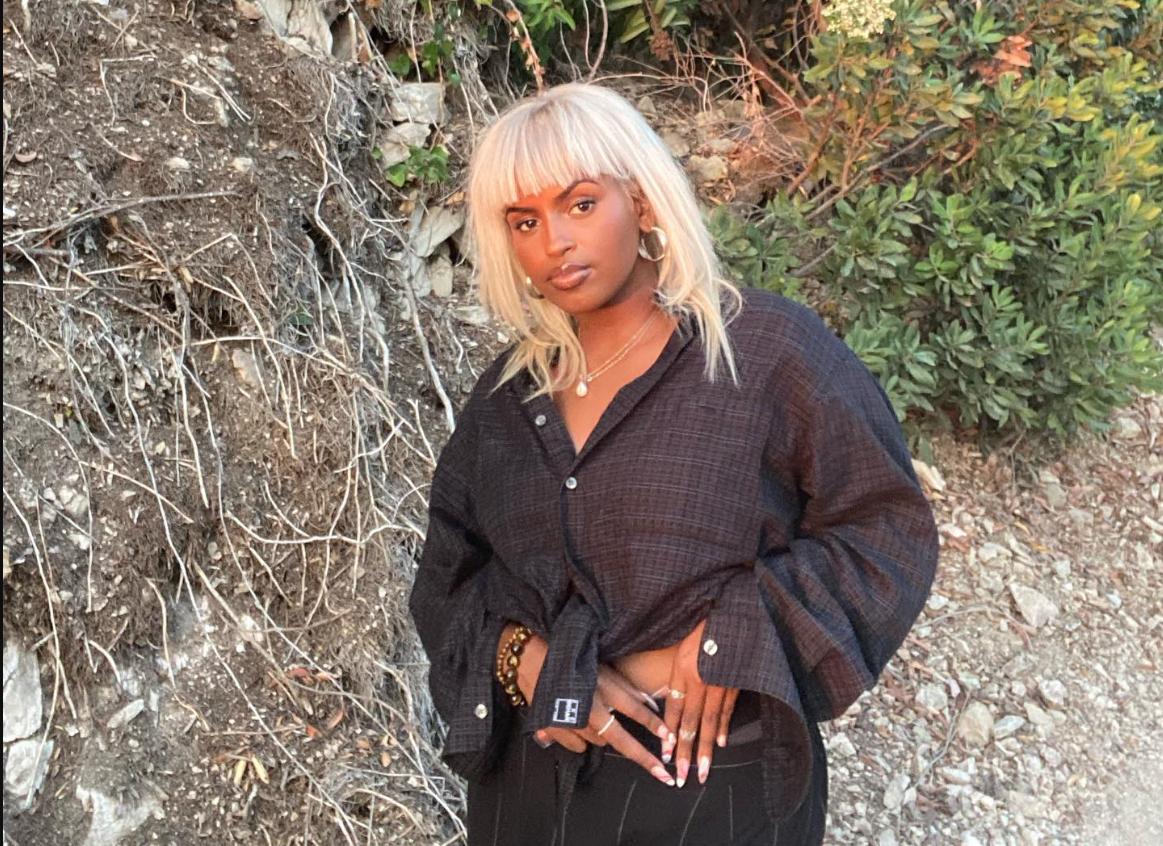
HOLLYWOOD – Idman, the gorgeous R&B toned singer/songwriter from Toronto, knows that the ability to be a safely out LGBTQ person is a privilege.
In a recent Los Angeles Blade opinion piece, they cautioned those progressives who are cavalier about the outing process. They became a spokesperson for those who are susceptible to its dangers. “I wish we told queer and trans youth more often that there is no standard within which to measure the authenticity of one’s identity, and that they’re valid whether they decide to come out or not. That the world’s reactions to their truths are not their fault, and that they are no less valid in their identities for deciding to withhold it from those they believe cannot honor them,” they write, fully conscious that teens coming out can spark abuse, depression and in some cases homelessness. They observe, “Statistics show that LGBTQ+ youth, especially those of color, are disproportionately affected by homelessness… It’s crucial to challenge the idea that queer and trans people owe intimate details of their lives to others.”
The risk of coming out is one that they, themselves, have been willing to take however, and they do so in a new EP aptly titled “Risk.”
“I know that I get to live in a world and have an experience where I have the privilege of figuring that out for myself… I have the opportunity to explore. I think I have more of a sadness now in me for my parents and for my relatives in the fact that I know that there are parts of them that they might not ever get to explore in this lifetime, and I know that it’s not their fault.” Idman tells me on the Rated LGBT Radio podcast.
Born in Toronto within a very close-knit Somali immigrant community, Idman seems an unlikely candidate to stand courageously as a non-binary sexually fluid musician. They were raised fluent in their parents’ mother tongue . “They really instilled a love for my culture. I was really prideful for my heritage… we come from a religious Muslim community, but my parents were super unorthodox and open minded.” Their mother was a wedding planner and part of that gig was to have the house constantly filled with musicians, leaving an aesthetic impact on the talented Idman.
Even though musically, Idman was initially exposed to the “love is forever” style wedding music, their relationship-oriented songs exhibit a deeper complexity. The songs do not depict a heroine and a villain, but rather two humans trying to figure things out. “When I was challenged to write about love, I was confronted with the fact that the R&B space was really in this energy of toxicity, that we are in an era of ‘ghosting’ and that you need to leave before you are left. I found this genre could only be done through honesty and I wanted my music to be the place where people can tap into the depth where it is not always black and white, and the other person isn’t always in the wrong.”
Idman leapt into the music scene in 2020 with their debut single Down for It. Right from the get, they seemed to signal that they were prepared for the challenges, confrontations and potential fight for individuality that lay ahead. “Feel like I was born for this (this), feel like it was calling me
Never been down for the comfortable, that’s just impossible Never walked the road that was paved for Me,” they sing. The song also projects Idman’s attitude towards those who are trans- and homo- phobic. “Have you ever met a hater, If you know (one) play this loud as hell, I can not hate you for not seeing for me what you can not see for yourself And I cannot hate me,
blessed highly favored while you sit o’ there by ya self.” It is an attitude that they also reflect in their Blade article when they say, “It’s a shame, it’s a stain and it should be the regret of a lifetime for someone to deny themselves the love of a queer or trans person because they can’t see beyond their own projection. What a flop. It is always their loss. I promise.”
Idman’s newest release, the EP Risk, and the extended Risk-Reloaded version, is about the complexities and codependence of relationships. From the prominent track Hate, which is an ode to hating one’s own feeling of longing for the object of one’s desire, to In My Feels, which laments the inability to let go, Idman examines the layers that could bring emotions in any Romeo and Juliet style romance gone afoul.
It is in the songs and videos for the tracks Beach and Still where Idman takes their own “risk” by truly revealing themselves. The object of affection in Beach is spelled out in the first line of the song. “I know you’re somebody’s girlfriend but I know you ain’t innocent, I can tell by how you lookin’ That you’re likin’ what you’re seein’ I can show you something better baby all you gotta do is say when.” Idman realized that when that song came out, they had essentially outed themselves as being LGBTQ. Their article that appears in the Blade was meant to be a letter to accompany that event, and to fully underscore what she was saying, and why.
The video for Still took things to a whole new level of representation. The video and song depict a fighting couple who are clearly not straight cisgender. It could be, in fact, a musical video first, showing a song featuring two trans people in a relationship, fighting emotions and attachment just as any other couple might.
I asked Idman if they felt brave in making the video. “I was scared. I tried to back out of it a couple times like the week before I called the director and was like actually can we switch? If you switch the lead out with my trainer, he’s 6’4…” but they did not switch. “I wanted to use it as an opportunity to show some love on the screen in a different way. I think it is often depicted in a really hyper sexualized way, and I wanted to show the romantic nature of this love, that there are arguments and break ups hurt as much as anyone else’s…I have this opportunity to show that we are here. I’ll take this shot for all the younger kids who need to see themselves in that.”
In 2022, Idman released the single Look at What I’m Doing to You, an ode to the heartbroken who turn tables and choose happiness instead. In it, she coyly teases us, “Look at what I’m doing to you. Told you that I’m trouble times two. It is what it is. So influential. It’s my effect on you.”
It is perfect instruction for those who are listening and vibing on all music Idman. From the self-talking “Down for It” through to the going for it “Risk”, Idman dares us to look at what they are doing to us.
They are pushing our consciousness on gender identity, and releasing our need to label and judge. They bathe this principle in rich rhythmic music and Somali poetic cadence, which speaks to our hearts and our souls.They are indeed “trouble times two”.
The effect, if you listen and absorb, is that Idman is “so influential.” We can only hope that influence explodes, and inspires strength for the vulnerable who need its confidence.
If that happens, the Risk will have been worth it, and that will be Idman’s legacy:
The ultimate effect on us.
Related:
******************************************************************************************

Rob Watson is the host of the popular Hollywood-based radio/podcast show RATED LGBT RADIO.
He is an established LGBTQ columnist and blogger having written for many top online publications including The Los Angeles Blade, The Washington Blade, Parents Magazine, the Huffington Post, LGBTQ Nation, Gay Star News, the New Civil Rights Movement, and more.
He served as Executive Editor for The Good Man Project, has appeared on MSNBC and been quoted in Business Week and Forbes Magazine.
He is CEO of Watson Writes, a marketing communications agency, and can be reached at robertgwatsonjr7@gmail.com
Music & Concerts
Tyler Childers’ sweet gay love story: 5+ GRAMMY nominations
“For all the ugliness that it’s going to bring out, that just can’t be helped. This is going to make real conversations possible”
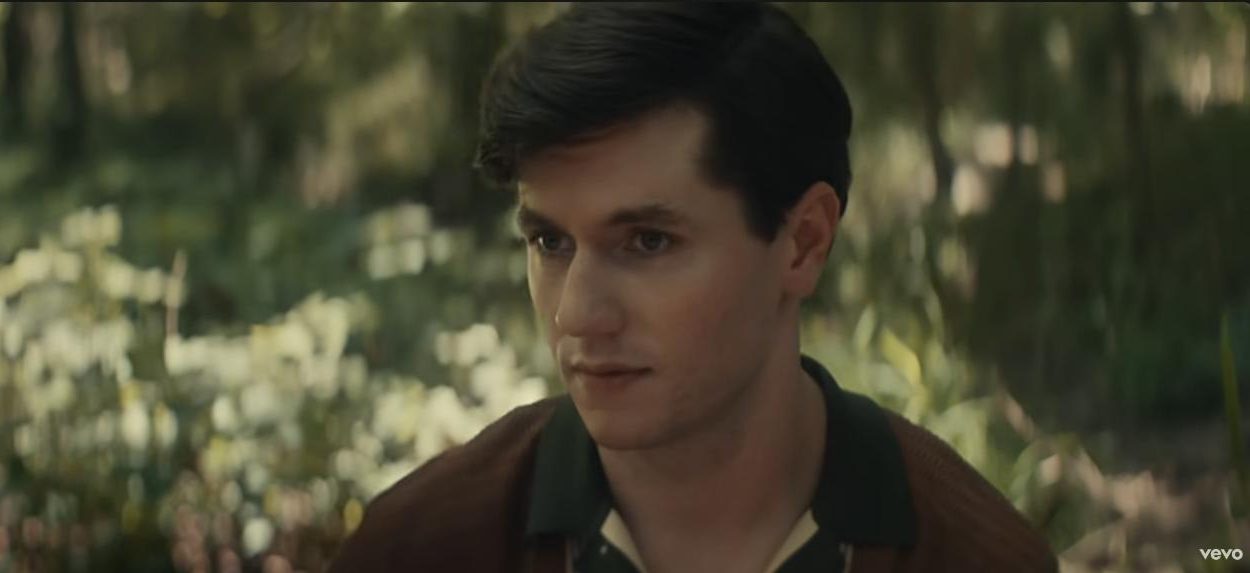
HOLLYWOOD – Tyler Childers has been at this rodeo before. He is not unaccustomed to receiving ire from the Bud Lite boycotting crowd. He caught hell in September 2020 with his album Long Violent History which revolved around the themes of racism, civil unrest and police brutality.
This time, the controversy is around a song on his hit album Rustin’ In The Rain. Rustin’ leads with a hit song titled In Your Love. In should be safe from controversy on its face. The lyrics, written by poet laureate Silas House, and are deeply romantic about a love both fought for, and lost, with no regrets.
Had the team of Childers and House stopped there, the cheap beer guzzling neanderthal crowd would have been happy.
They didn’t. Instead, they created a gorgeously acted, poignant music video about two gay miners in Kentucky. In the video, one of of the lovers is taken down with black lung disease, a common and undiscussed killer. The video was written by, and creatively directed by House. He stated bluntly about the project, “These are human stories, not political stories.”
The concept was Childers’s idea. He sought to tell the world about his LGBTQ family members’ life experiences. He had been particularly impacted by his gay cousin who fled Kentucky and never came back. Childers was particularly bothered that his cousin had never seen any kind of country music video that spoke to him.
Now one does. The video stars openly gay stars Colton Haynes and James Scully. The couple fall in love in the coal mines and move on to become sustenance farmers. Along the way, they encounter violent homophobia, but stand strong and go to parties, host loved ones, and work their land to establish a simple life. Their romance comes to a tragic end when one dies from coal miners’ pneumoconiosis, and his widower stays alone for the rest of his life.
“I wasn’t expecting to come here and bawl my eyes out but here we are. So beautiful and so sad all at the same time,” fan Trey Tackett writes on YouTube. Trey was not alone. The video has brought together many people from various walks of life who are reacting to the pure humanity of the story, and to the specifics of Appalachian life, rarely depicted.
From scared mothers like Monica Carmon, “I just heard this on the way home from work and immediately searched for it because of the way it touched me. Sitting outside in my car sobbing watching the video. This hits so close to home. My youngest son is openly gay and my greatest fear as a mother is that someone full of hate will harm him. Love is love. Please never forget that,” to another fan who has lived life without the inspiration that Childers has given, “I can’t properly quantify what a difference it would’ve made if people like you stood up for people like me when I was a kid. I’m so grateful younger people now have you. Thank you and the actors, team for a beautiful video,” he says.
Others have shared how the fight for love, even when ill-fated, is worth it. K C Geno stated, “This hits home. I lost my soulmate of 42 years to leukemia in November of 2019. Thank you so much for going out on a limb to recognize the beauty of love.”
The universality of the song even reached those who were not particularly moved by the fight against homophobia, “Dude I don’t care about the two men in love! This song is a beautiful testament of finding true love and the inevitability of having to watch it leave you! This life whether gay or straight we all face this! Beautiful song and video! Tyler thank you so much for this song! We all need this kind of love in our lives to prove it wasn’t all for nothing!” stated “Dark Fanged Sword”.
Some shared how much this dramatic depiction has been lived by them in real life. Arnold Tucker related, “This is a great video, it shows what some of us have had to live daily… the hate and non acceptance. I am now a retired police officer and my Partner was a EMS Paramedic for the Texas County we lived in. My Jim died August 5th, 2000, and it still a hard thing to deal with. The Love we shared was wonderful, and I [will] probably never have that feeling again. Thank You Tyler for showing this side of life that most still hide and deal with.”
Another man named Jeffrey found the song timely, as he was in the throws of losing his husband. Just after his husband died, Jeffrey posted, “My husband just passed and this song is my song to him. I put my phone to his ear so he could hear it. In my darkest time this young man’s music is getting me through it.”
No one seems to care much about the haters. Childers was ready for it at the outset. “For all the ugliness that it’s going to bring out, that just can’t be helped. This video is going to make real conversations possible.”
As for his fans, they welcome the adversity from the close minded. Their attitude is “Don’t let the concert venue doors slap you in the ass on the way out.” The new Childers’s fans are more than eager to buy up any concert tickets that haters want to leave behind.
The GRAMMY awards seem equally unfazed by the “anti-wokers.” They showered Childers with five 2024 nominations. He is up for Best Country Solo Performance for In Your Love, Best Country Song for In Your Love, Best Country Album for Rustin’ in the Rain, and Best Music Video for In Your Love. House is nominated for one, Best Music Video for In Your Love.
The fans agree. Per “mmjsstav”, “Wow. Video had me absolutely in tears. And what a terrific, incredibly well written and composed song. The Grammy nominations are so well deserved!! Hadn’t heard of you before this, but now I”m a huge fan and will be buying your records.”
Now, we have to wait until early next year to see if Childers and House win, as many think they should. Fan after fan declare the video not just to be great, but to be the “best video they have ever seen.”
It actually does not matter what happens for Childers and House February 4th at the Crypto.com Arena.
For all the conversations they have started, the real life stories that they inspired to be told, for lovers motivated, and tears shed….
In the most consequential ways, they have already won.
Related:
Tyler Childers – In Your Love (Official Video):
******************************************************************************************

Rob Watson is the host of the popular Hollywood-based radio/podcast show RATED LGBT RADIO.
He is an established LGBTQ columnist and blogger having written for many top online publications including The Los Angeles Blade, The Washington Blade, Parents Magazine, the Huffington Post, LGBTQ Nation, Gay Star News, the New Civil Rights Movement, and more.
He served as Executive Editor for The Good Man Project, has appeared on MSNBC and been quoted in Business Week and Forbes Magazine.
He is CEO of Watson Writes, a marketing communications agency, and can be reached at robertgwatsonjr7@gmail.com
Music & Concerts
Gay Country artist & sibling win Vocal Duo at 57th CMA awards
In addition to the Brothers Osborne winning Vocal Duo of the Year, Country singer Lainey Wilson took home 3 of the top awards of the night
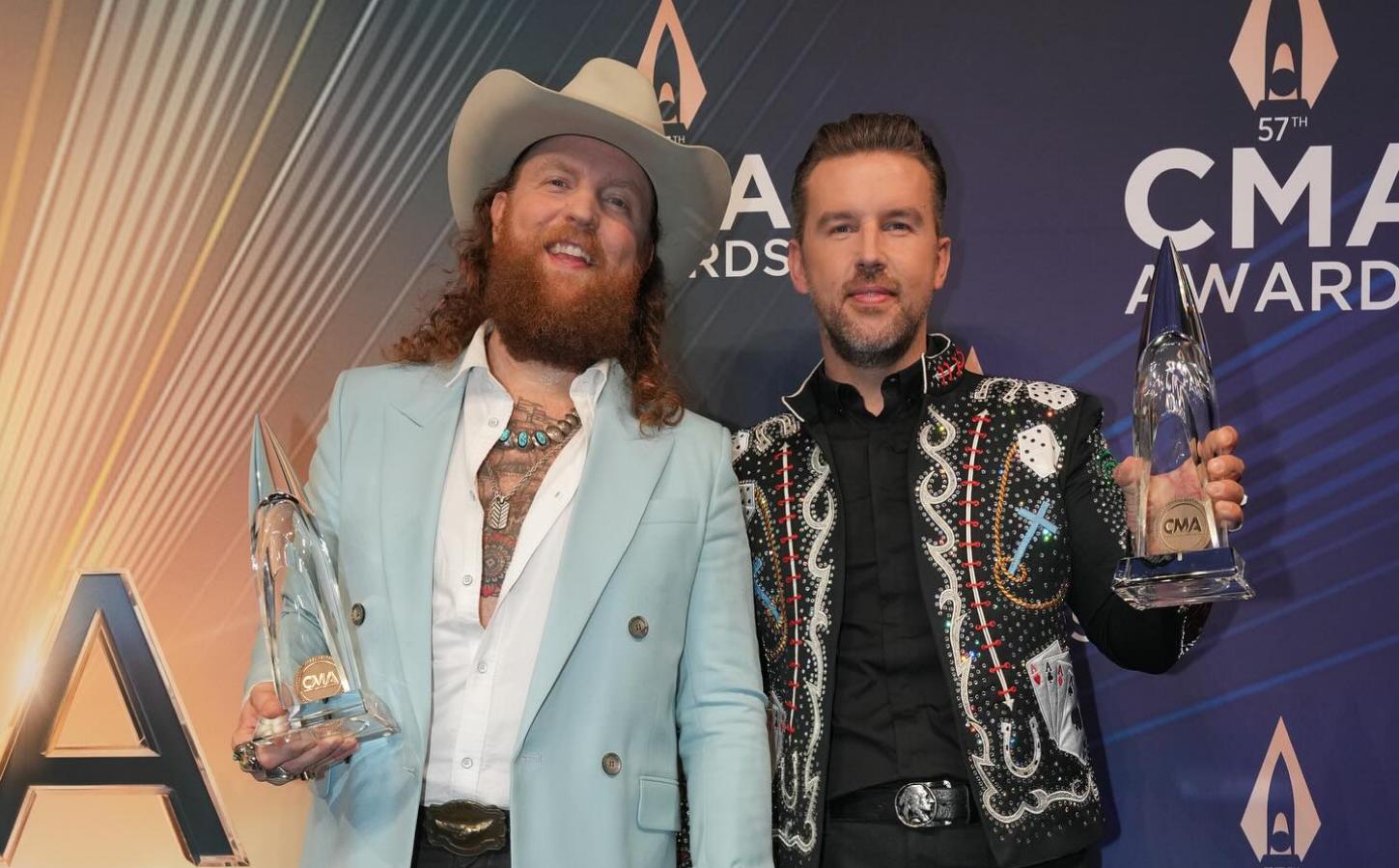
NASHVILLE, Tenn. – The biggest names in Country music gathered Wednesday evening at Music City’s Bridgestone Arena for the 57th Annual Country Music Association Awards, hosted again this year by Country star Luke Bryan alongside former NFL star Peyton Manning.
Walking away with Vocal Duo of the Year were sibling musicians John and TJ Osborne.
The Brothers Osborne as they are known by, in previous years have won in this category, this year making it their sixth win.
T.J. Osborne, lead singer of the country duo, came out as gay in an exclusive interview with Time Magazine, which was published February 3, 2021.
While other ostensibly country artists are openly LGBTQ (such as Orville Peck, Brandi Carlile, Lil Nas X, Chely Wright and Billy Gilman, Osborne’s revelation makes him the first – and so far, only – openly gay musical artist signed to a major country label.
John and TJ Osborne grew up in the small Chesapeake Bay bayside town of Deale, in Anne Arundel County, Maryland, writing and playing songs for friends and family in their father’s shed. T.J. with his brother John formed the Brothers Osborne duo in 2012. Signed with EMI Records Nashville, they’ve released seven country Top 40 singles and three studio albums, to date. Their platinum hit “Stay a Little Longer,” was a crossover to mainstream radio.
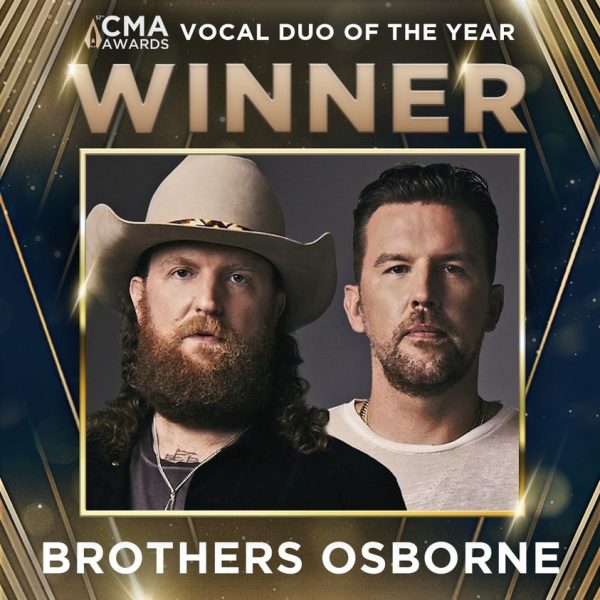
The siblings took home their first GRAMMY in 2022, winning Best Country Duo/Group Performance for their song “Younger Me,” inspired by TJ’s coming out. The band has been nominated for 10 GRAMMYs in total, standing as a now six-time CMA Vocal Duo of the Year, and are three-time ACM Duo of the Year.
Overall, they have collected six CMA awards, six ACM trophies and received the ASCAP Vanguard Award in 2019. Their critically acclaimed hit songs have tallied multiple RIAA Gold and Platinum certifications, while surpassing more than 2.5 Billion global streams.
In addition to the Brothers Osborne winning Vocal Duo of the Year, Country singer-songwriter Lainey Wilson took home three of the top awards of the night, including the coveted entertainer of the year award, as well as female vocalist of the year and album of the year.
This is also the first time in CMA history that two women have been nominated for Entertainer of the Year in four consecutive years.
Complete list of winners and nominees:
| Entertainer of the Year | Album of the Year |
| Lainey Wilson (Winner) Luke Combs Chris Stapleton Carrie Underwood Morgan Wallen (Nominees) | Bell Bottom Country — Lainey Wilson (Winner) Ashley McBryde Presents: Lindeville — Ashley McBryde Gettin’ Old — Luke Combs One Thing at a Time — Morgan Wallen Rolling Up the Welcome Mat — Kelsea Ballerini (Nominees) |
| Male Vocalist of the Year | Female Vocalist of the Year |
| Chris Stapleton (Winner) Luke Combs Jelly Roll Cody Johnson Morgan Wallen (Nominees) | Lainey Wilson (Winner) Kelsea Ballerini Miranda Lambert Ashley McBryde Carly Pearce (Nominees) |
| Vocal Group of the Year | Vocal Duo of the Year |
| Old Dominion (Winner) Lady A Little Big Town Midland Zac Brown Band (Nominees) | Brothers Osborne (Winner) Brooks & Dunn Dan + Shay Maddie & Tae The War and Treaty (Nominees) |
| Single of the Year | Song of the Year |
| “Fast Car” — Luke Combs (Winner) “Heart Like a Truck” — Lainey Wilson “Need a Favor” — Jelly Roll “Next Thing You Know” — Jordan Davis “Wait in the Truck” — HARDY (feat. Lainey Wilson) (Nominees) | “Fast Car” — Tracy Chapman (Winner) “Heart Like a Truck” — Trannie Anderson, Dallas Wilson and Lainey Wilson “Next Thing You Know” — Jordan Davis, Greylan James, Chase McGill and Josh Osborne “Tennessee Orange” — David Fanning, Paul Jenkins, Megan Moroney and Ben Williams “Wait in the Truck” — Renee Blair, Michael Hardy, Hunter Phelps and Jordan Schmidt (Nominees) |
| New Artist of the Year | Musician of the Year |
| Jelly Roll (Winner) Zach Bryan Parker McCollum Megan Moroney Hailey Whitters (Nominees) | Jenee Fleenor (Winner) Paul Franklin Rob McNelley Derek Wells Charlie Worsham (Nominees) |
| Music Video of the Year | Musical Event of the Year |
| “Wait in the Truck” — HARDY (feat. Lainey Wilson) (Winner) “Light On in the Kitchen” — Ashley McBryde “Memory Lane” — Old Dominion “Need a Favor” — Jelly Roll “Next Thing You Know” — Jordan Davis (Nominees) | “Wait in the Truck” — HARDY (feat. Lainey Wilson) (Winner) “Save Me” — Jelly Roll and Lainey Wilson “She Had Me at Heads Carolina (Remix)” —Cole Swindell and Jo Dee Messina “Thank God” — Kane Brown and Katelyn Brown “We Don’t Fight Anymore” (feat. Carly Pearce) (Nominees) |
-

 National4 days ago
National4 days agoDiscredited former cop played ‘key role’ in deportation of gay make-up artist
-

 Arts & Entertainment3 days ago
Arts & Entertainment3 days agoA Night of legacy, love, and liberation: Inside the 2025 April Fool’s Ball
-

 Movies3 days ago
Movies3 days agoHeartfelt ‘Wedding Banquet’ remake a romcom worth seeing
-

 Arts & Entertainment4 days ago
Arts & Entertainment4 days agoSouth Coast Repertory Theatre hosting world premiere production
-

 California5 days ago
California5 days agoSouth Park provides green space to a predominantly Latino community
-

 Brazil3 days ago
Brazil3 days agoUS lists transgender Brazilian congresswoman’s gender as ‘male’ on visa
-

 opinions2 days ago
opinions2 days agoOver 36,000 Angelenos unite for ‘Fighting the Oligarchy’ rally
-

 Congress2 days ago
Congress2 days agoEXCLUSIVE: Garcia demands answers on deportation of gay Venezuelan asylum seeker
-
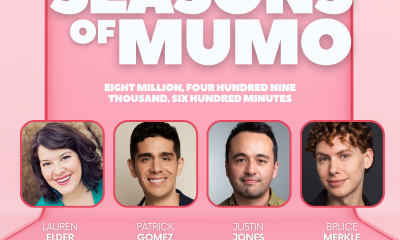
 Theater2 days ago
Theater2 days ago‘The Broadway Cage Match’ ready to rumble at WeHo’s Musical Mondays
-

 Books18 hours ago
Books18 hours ago‘Pronoun Trouble’ reminds us that punctuation matters



